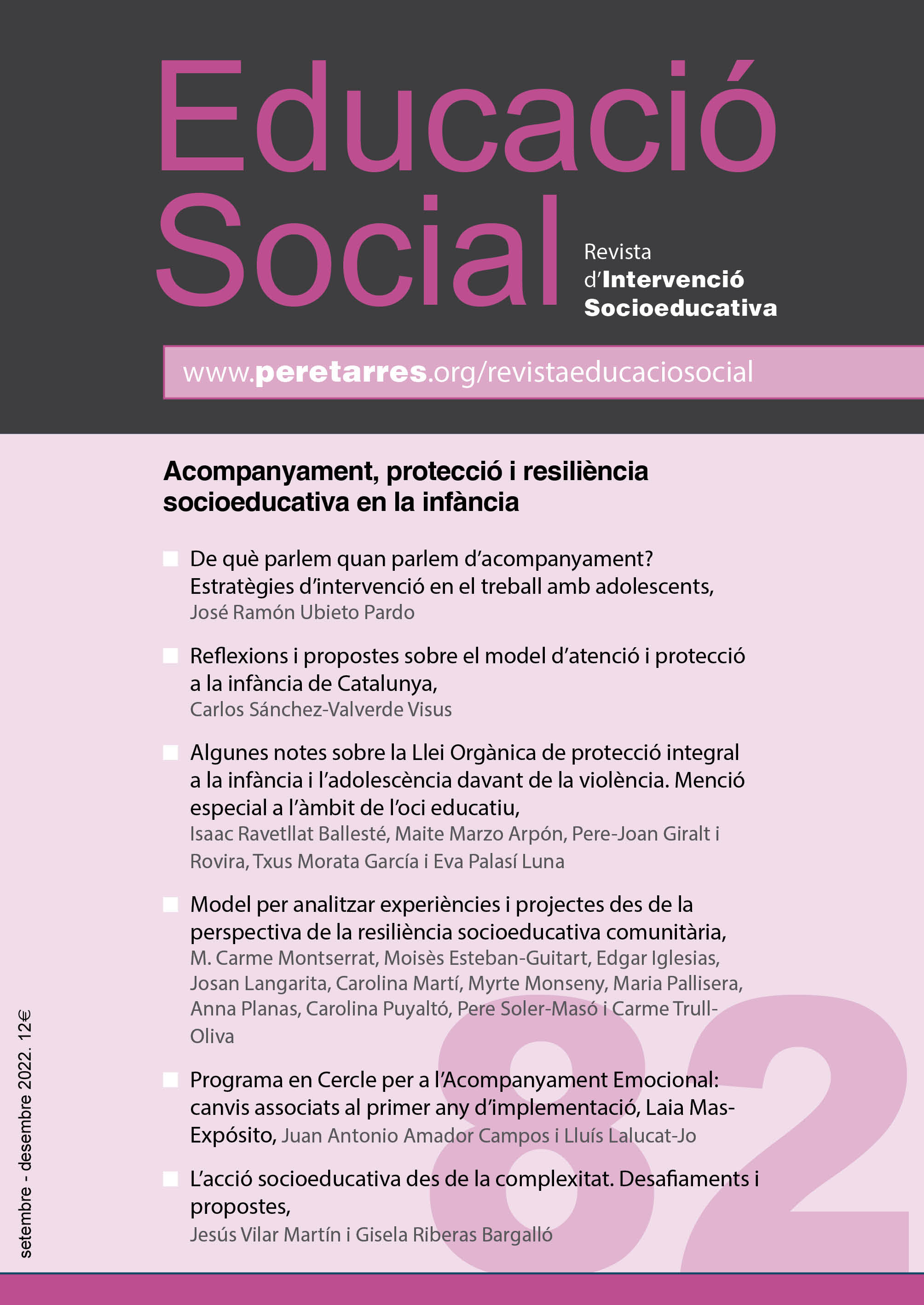Abstract
Professional action rests on four mutually dependent pillars: a solid epistemological framework to interpret the phenomena on which we want to operate; a professional culture to provide a technical framework for action and which must be coherent with the theoretical assumptions from which reality is described; a legal and juridical framework that regulates the activity; and an ethical approach to the moral duties and ethical
commitments that are acquired with society and with the people to whom we provide care. This article focuses on the current mismatch that exists between the epistemological framework and the professional culture based on which technical processes are constructed. While the former is based largely on theories of complexity, responses are still given from the perspective of active professionalism typical of a Cartesian positivist model when our work should be based on reflective professionalism. This mismatch directly affects the effectiveness and efficiency of professional activity and also generates contradictions of an ethical nature. From this starting point, the paper identifies the essential elements of
theories of complexity that should be taken into account in professional action. Furthermore, it describes the two
predominant professional cultures (reflective and active) and makes technical proposals from the perspective of reflective professionalism to ensure coherence with the epistemological model of complexity
Keywords
References
Alhadeff-Jones, M. (2008). Trois Générations de Théories de la Complexité: Nuances et Ambiguités. http://www.intelligence- complexite.org/fileadmin/docs/0805michel.
Bertalanffy, L. V. (1974). Robots, hombres y mente. Guadarrama.
Bertalanffy, L. V. (1976). Teoría general de los sistemas. Fondo de Cultura económica.
Bronfrenbrenner, Urie (1987). La ecología del desarrollo humano. Paidós
Caride, J. A. (2003). Teories, models i paradigmes en Pedagogia-Educació Social. En: Planella, J; Vilar, J. (coords). L’educació Social: projectes, perspectives i camins, p. 47-72. Pleniluni.
Caride, J. A. (2005). Las fronteras de la pedagogía social. Gedisa.
De Sousa, B. (2018). Más allá del pensamiento abismal: de las líneas globales a una ecología de saberes. Revista Red bioética. Unesco. https://redbioetica.com.ar/pensamiento-abismal/
Díaz, J. y Civis, M. (2011). Redes socioeducativas promotoras de capital social en la comunidad: un marco teórico de referencia. Cultura y Educación, núm. 23 (3), 415-429. Fundación Infancia y Aprendizaje
Elliot, J. (1989). Pràctica, recerca i teoria en educació. Eumo Editorial.
Gimeno S. J. (1987). Teoría de la enseñanza y desarrollo del currículo. Anaya.
Imbernon, F. (1994). La formación y el desarrollo profesional del profesorado. Hacia una nueva cultura profesional. Graó.
Kemmis, S.; Mc. Taggart, R. (1988). Cómo planificar la investigación-acción. Laertes.
Martínez, M. (1986). Inteligencia y educación. P.P.U.
Martínez, M. (1987). Dimensiones adaptativas y proyectivas de los sistemas. En: A. Castillejo, J. L.; Colom, A. Pedagogía sistémica, p. 221-236. Ceac.
Morin, E. (2006). El método. Vol. 6. Ética. Cátedra.
Morin, E. (2008). Introducción al pensamiento complejo. Gedisa.
Peñalver, C. (1987). Las explicaciones sistémicas: una aproximación a la epistemología sistémica. En: Castillejo, J. L.; Colom, A. Pedagogía sistémica, p. 45-63. Ceac.
Perrenoud, Ph. (2004). Diez nuevas competencias para enseñar. Graó.
Puig, J. (1986). Teoría de la educación. P.P.U.
Riberas, G. y Vilar, J.; (2014). La praxis reflexiva: un reto para la educación social. Revista Edetania. Estudios y propuestas socio-educativas, 45, 129-142. https://revistas.ucv.es/edetania/index.php/Edetania/article/view/177
Sáez, J. (1997). La construcción de la pedagogía social: algunas vías de aproximación. En: Petrus, A. Pedagogía social, p. 40-67. Ariel.
Sanvisens, A. (1984). Educación, Pedagogía y Ciencias de la Educación. En: Introducción a la Pedagogía General. VV.AA. Barcanova.
Schön, D. (1998). El profesional reflexivo. Cómo piensan los profesionales cuando actúan. Paidos.
Stenhouse, L. (1987a). La investigación como base de la enseñanza. Morata.
Stenhouse, L. (1987b). Investigación y desarrollo del currículum. Morata.
Sternberg, R. (1986). Las capacidades humanas. Labor Universitaria.
Úcar, X. (2016). Relaciones socioeducativas. La acción de los profesionales. Editorial UOC.
Vilar, J. (2008). Implicaciones éticas del trabajo en red y la acción comunitaria. Cultura y Educación, 20, p. 266-277. Fundación Infancia y Aprendizaje.
Vilar, J.; Riberas, G. y Rosa, G. (2014). El compromiso de la universidadfrente a un mundo incierto y complejo. Propuestas para la formación de profesionales reflexivos. Revista Lugares d’Educaçao v. 4, núm. 9, 132-149.
https://periodicos.ufpb.br/ojs/index.php/rle/article/view/18906
Vilar, J. (2018). Elementos de reflexión para el futuro próximo de la educación social. Educació Social. Revista d’Intervenció Socioeducativa, 70, 17-38. https://www.raco.cat/index.php/EducacioSocial/article/view/344027/439642
Rights

This work is licensed under a Creative Commons Attribution-NonCommercial 4.0 International License.
(c) Facultat d'Educació Social i Treball Social Pere Tarrés. Universitat Ramon Llull, 2023
Copyright
Educació social. Revista d'intervenció socioeducativa es publica en accés obert sota la llicència Creative commons reconeixement-nocomercial (by-nc): es permet l’ús del seu contingut sempre que se citi l’autor o l’autora i la publicació, amb la seva adreça electrònica exacta. Es permet la generació d’obres derivades sempre que no se’n faci un ús comercial. Tampoc no es pot utilitzar l’obra original amb finalitats comercials.
El copyright © de la revista pertany a la Facultat d'Educació Social i Treball Social Pere Tarrés. Universitat Ramon Llull



